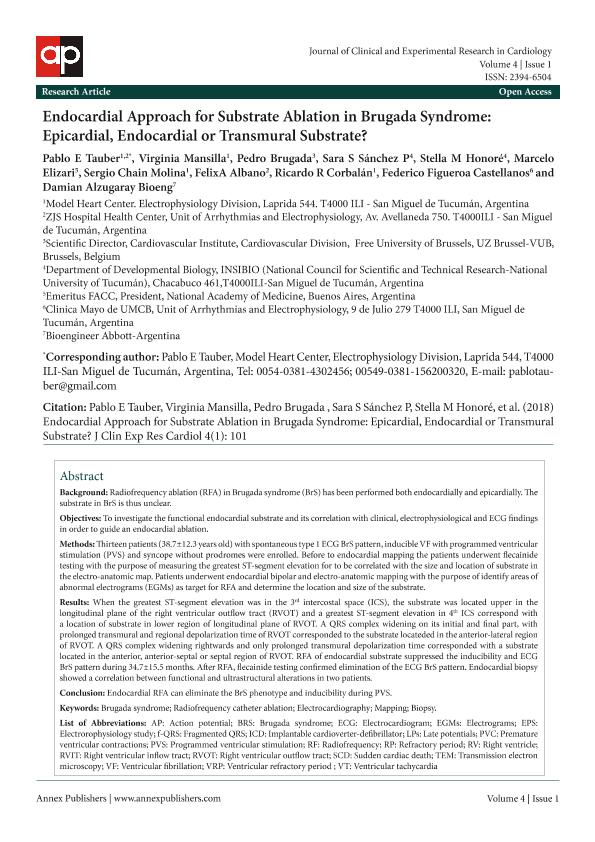Mostrar el registro sencillo del ítem
dc.contributor.author
Tauber, Pablo E.
dc.contributor.author
Mansilla, Virginia
dc.contributor.author
Brugada, Pedro
dc.contributor.author
Sanchez, Sara Serafina del V.

dc.contributor.author
Honore, Stella Maris

dc.contributor.author
Elizari, Marcelo
dc.contributor.author
Chain Molina, Sergio
dc.contributor.author
Albano, Félix A.
dc.contributor.author
Corbalán, Ricardo R.
dc.contributor.author
Figueroa Castellanos, Federico
dc.contributor.author
Alzugaray, Damián
dc.date.available
2020-04-03T19:52:26Z
dc.date.issued
2018-06
dc.identifier.citation
Tauber, Pablo E.; Mansilla, Virginia; Brugada, Pedro; Sanchez, Sara Serafina del V.; Honore, Stella Maris; et al.; Endocardial Approach for Substrate Ablation in Brugada Syndrome: Epicardial, Endocardial or Transmural Substrate?; Annex Publishers; Journal of Clinical and Experimental Research in Cardiology; 4; 1; 6-2018; 1-13
dc.identifier.issn
2394-6504
dc.identifier.uri
http://hdl.handle.net/11336/101940
dc.description.abstract
Background: Radiofrequency ablation (RFA) in Brugada syndrome (BrS) has been performed both endocardially and epicardially. The substrate in BrS is thus unclear.Objectives: To investigate the functional endocardial substrate and its correlation with clinical, electrophysiological and ECG findings in order to guide an endocardial ablation.Methods: Thirteen patients (38.7±12.3 years old) with spontaneous type 1 ECG BrS pattern, inducible VF with programmed ventricular stimulation (PVS) and syncope without prodromes were enrolled. Before to endocardial mapping the patients underwent flecainide testing with the purpose of measuring the greatest ST-segment elevation for to be correlated with the size and location of substrate in the electro-anatomic map. Patients underwent endocardial bipolar and electro-anatomic mapping with the purpose of identify areas of abnormal electrograms (EGMs) as target for RFA and determine the location and size of the substrate.Results: When the greatest ST-segment elevation was in the 3rd intercostal space (ICS), the substrate was located upper in the longitudinal plane of the right ventricular outflow tract (RVOT) and a greatest ST-segment elevation in 4th ICS correspond with a location of substrate in lower region of longitudinal plane of RVOT. A QRS complex widening on its initial and final part, with prolonged transmural and regional depolarization time of RVOT corresponded to the substrate locateded in the anterior-lateral region of RVOT. A QRS complex widening rightwards and only prolonged transmural depolarization time corresponded with a substrate located in the anterior, anterior-septal or septal region of RVOT. RFA of endocardial substrate suppressed the inducibility and ECG BrS pattern during 34.7±15.5 months. After RFA, flecainide testing confirmed elimination of the ECG BrS pattern. Endocardial biopsy showed a correlation between functional and ultrastructural alterations in two patients.Keywords: Brugada syndrome; Radiofrequency catheter ablation; Electrocardiography; Mapping; Biopsy.Conclusion: Endocardial RFA can eliminate the BrS phenotype and inducibility during PVS.
dc.format
application/pdf
dc.language.iso
eng
dc.publisher
Annex Publishers
dc.rights
info:eu-repo/semantics/openAccess
dc.rights.uri
https://creativecommons.org/licenses/by/2.5/ar/
dc.subject
BRUGADA SYNDROME
dc.subject
ULTRASTRUCTURAL ALTERATIONS
dc.subject
ELECTROCARDIOGRAPHY
dc.subject
MAPPING
dc.subject
RADIOFREQUENCY CATHETER ABLATION
dc.subject
BIOPSY
dc.subject.classification
Bioquímica y Biología Molecular

dc.subject.classification
Ciencias Biológicas

dc.subject.classification
CIENCIAS NATURALES Y EXACTAS

dc.title
Endocardial Approach for Substrate Ablation in Brugada Syndrome: Epicardial, Endocardial or Transmural Substrate?
dc.type
info:eu-repo/semantics/article
dc.type
info:ar-repo/semantics/artículo
dc.type
info:eu-repo/semantics/publishedVersion
dc.date.updated
2019-10-16T19:29:01Z
dc.journal.volume
4
dc.journal.number
1
dc.journal.pagination
1-13
dc.journal.pais
Estados Unidos

dc.journal.ciudad
Virginia
dc.description.fil
Fil: Tauber, Pablo E.. Centro Modelo del Corazón; Argentina. Gobierno de Tucumán. Ministerio de Salud. Hospital Centro de Salud "Zenón J. Santillán"; Argentina
dc.description.fil
Fil: Mansilla, Virginia. Centro Modelo del Corazón; Argentina
dc.description.fil
Fil: Brugada, Pedro. Free University of Brussels. Cardiovascular Division. Cardiovascular Institute; Bélgica
dc.description.fil
Fil: Sanchez, Sara Serafina del V.. Consejo Nacional de Investigaciones Científicas y Técnicas. Centro Científico Tecnológico Conicet - Tucumán. Instituto Superior de Investigaciones Biológicas. Universidad Nacional de Tucumán. Instituto Superior de Investigaciones Biológicas; Argentina. Universidad Nacional de Tucumán. Facultad de Bioquímica, Química y Farmacia; Argentina
dc.description.fil
Fil: Honore, Stella Maris. Universidad Nacional de Tucumán. Facultad de Bioquímica, Química y Farmacia; Argentina. Consejo Nacional de Investigaciones Científicas y Técnicas. Centro Científico Tecnológico Conicet - Tucumán. Instituto Superior de Investigaciones Biológicas. Universidad Nacional de Tucumán. Instituto Superior de Investigaciones Biológicas; Argentina
dc.description.fil
Fil: Elizari, Marcelo. Academia Nacional de Medicina de Buenos Aires; Argentina
dc.description.fil
Fil: Chain Molina, Sergio. Centro Modelo del Corazón; Argentina
dc.description.fil
Fil: Albano, Félix A.. Gobierno de Tucumán. Ministerio de Salud. Hospital Centro de Salud "Zenón J. Santillán"; Argentina
dc.description.fil
Fil: Corbalán, Ricardo R.. Centro Modelo del Corazón; Argentina
dc.description.fil
Fil: Figueroa Castellanos, Federico. Clínica Mayo; Argentina
dc.description.fil
Fil: Alzugaray, Damián. Abbott; Argentina
dc.journal.title
Journal of Clinical and Experimental Research in Cardiology
dc.relation.alternativeid
info:eu-repo/semantics/altIdentifier/url/http://www.annexpublishers.com/articles/JCERC/4101-Endocardial-Approach-for-Substrate-Ablation-in-Brugada-Syndrome-Epicardial-Endocardial-or-Transmural-Substrate.pdf
Archivos asociados
